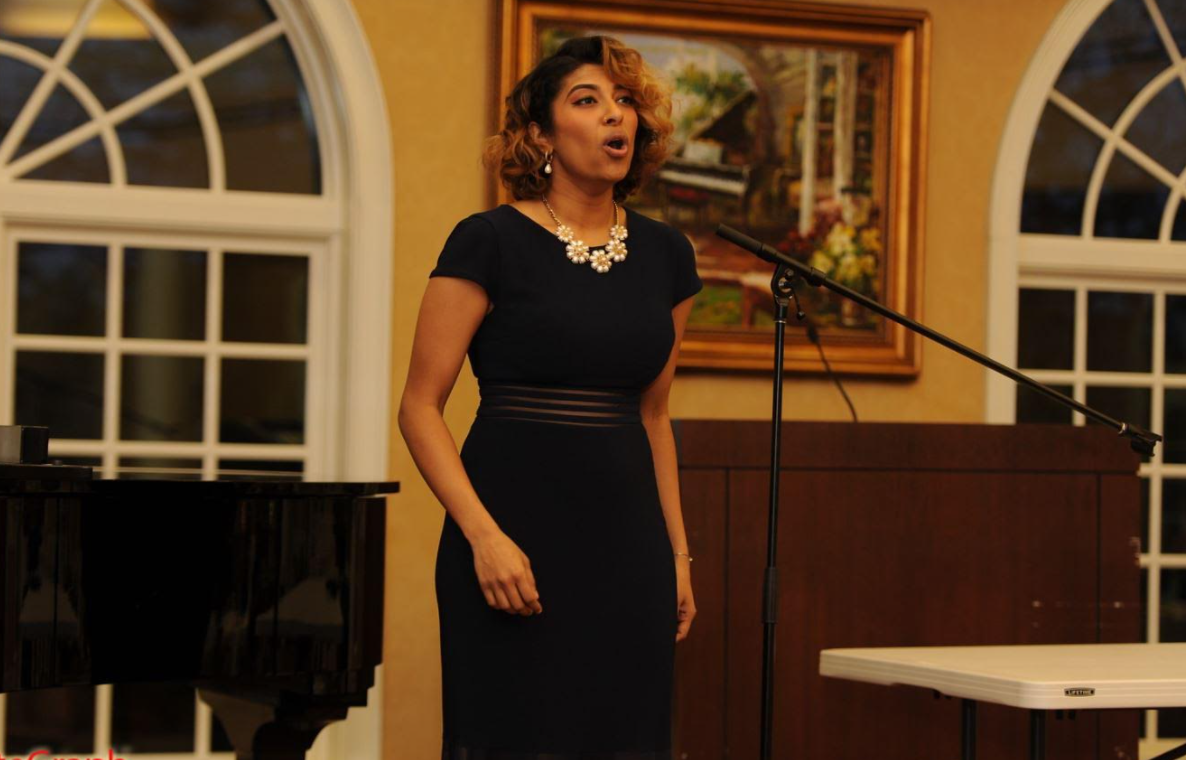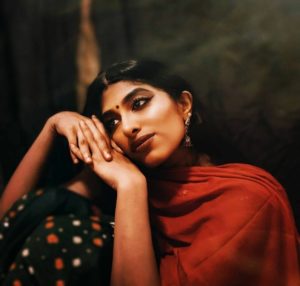The hall echoed with Raji’s exuberance as she sang to her heart’s content at the launch of Saris to Suits Purple Lotus legal fundraising event. The award-winning artist made waves with her rich and reverberating vocals and enhanced opera’s representation in the Indian-American community. In a candid chat with us, Raji Venkat talks about her fresh and versatile take on music and finding her feet as a brown kid.
(Atlanta, GA, November 15, 2021): When 17-year-old Raji Venkat told her software engineer parents that she wanted to major in music, they were more confused than decisive. “I think they could see right through that I was too flippant about my career and asked me to think it over.” After much contemplation, she was put into classes which needed her to clear the auditions. “My mom video recorded my performance. After the audition, I got a call saying I had possible potential and that I had been accepted.” The artist had no idea her life was about to change forever. She went into undergraduate at Augusta University, Georgia, thinking it was just going to be music. Little did she know they had to do choir and piano. “I did not know how to sing, let alone qualify for three languages and subject theory at various levels. It was truly exhausting. There was not a day when I did not quit mentally.” It seems fate had different plans for this statuesque young woman. A chance to play a part in the musical ‘Into the woods’ gave Raji a sense of belief. She took a plunge and after years of blood, sweat and mental exhaustion went on to join New England Conservatory for her grad to learn opera.

Those who have seen her performing agree that Raji’s understanding of opera goes well beyond a stage performance. She calls it a stimulating medium to learn the unknown and loves the thrill that comes along with it. In future, the avant-garde soprano aims to compose operas based on ancient Indian texts. According to her, “It may unfold a whole new world for the Indian community who wants to understand and connect with these texts.”

The vivacious 26-year-old simply hates to be pigeonholed. Time and again she has tried to untangle from the knots of conformity and position herself as a multifaceted artist. Besides opera, her repertoire includes Bharatnatyam, ballet, and Gymnastics. She feels operating at the intersections of classical and contemporary has amplified her understanding of the subject. In the past, Raji has tried to experiment across genres, for instance, combining Bharatnatyam and ballet which are two different artforms but come from the same line of dance. “They go so well together, if you ask me. Every dance has a grace to it and ballet makes Bharatnatyam more beautiful, elegant and engaging. There are so many types of each that it’s really fun when you mix and match.”
Parallel to studying opera, the Bharatnatyam exponent is also well trained in Carnatic music and often swings between classical Indian vocals and operatic vocals. When asked how she balances the two, she says, “It’s like picking an outfit. I just choose what I want to do.” But confesses the challenges and complexity that comes with touching the two ends of the musical axis, “It’s not been an easy road. On one end, opera has vibration tendencies, on the other, Carnatic music does not encourage vibrations. In opera, teachers encourage you to actively feel your body and engage with it, they would keep asking you, “How are you feeling?”, “What are you thinking?”. In Carnatic music, no questions are asked, you just have to follow the instructions well and master your technique. Since both are forms of storytelling, straddling between the two is easy. You can interpret however you want and perform.”

Time and again, the young artist has used her voice to tune out ignorance that Indian Americans face while establishing their foot in the West. Citing her own example, the powerhouse of talent shares, “I have had teachers making explicit comments on my skin color, hair, and nails. Sometimes, even my opinions and suggestions were categorically shut down because of that. It’s hurtful and frustrating. But I am quite headstrong, so it doesn’t bother me for too long.” Raji also confesses that her Indian-ness has been hard for her to overcome. “Back in the village in India, whenever I tell anyone that I am learning opera, they ask me, “Why aren’t you studying commerce or engineering or medical?” There is a sudden lack of response and interest when I tell them about my career aspirations, be it family or relatives. This unresponsive, stifling attitude towards art and creativity here saddens me. That way, I am grateful to my parents for migrating to the US. Should we have continued to live in India, I may not have gotten the opportunities I have.”
Could this be a reason why India has seen only a handful of opera singers? “No. Indians are very prideful of their culture, which I am too, but just because opera is a rare feat in India doesn’t mean Indians are indifferent to it. I believe the Indian community wants a steady and safe path for their children’s future. The world is changing though. More and more Indians are now exploring this field. We are close to a hundred, barring the youth,” explains Raji.
Currently, the multidisciplinary artist is auditioning for Indian operas and aims to use the coming year to expand the opera community in India. She feels her rich experience can benefit singers aspiring to have a career in the western classical field.
(Manvi Pant is a staff writer for Saris to Suits ® Omniscient Perspective. After a corporate career spanning eight years, she has moved to academics and also runs her storytelling platform Real Life Heroes. Founded by former network news anchor Patti Tripathi, US-based Saris to Suits ® focuses on building awareness to break down the barriers that constrain the advancement of women and girls. We aim to advance women’s empowerment, education, gender inclusivity, equality and social justice. www.SarisToSuits.org)



